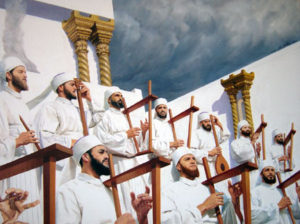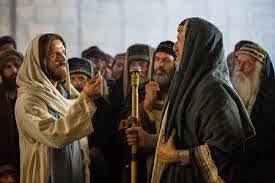Whose Son is the Messiah?
Matthew 22:41-46; Mark 12:34b-37; Luke 20:41-44
Wednesday the thirteenth of Nisan
Whose Son is the Messiah? DIG: Were the Pharisees expecting the Messiah to be human or divine? What problem with this does Jesus point out? Why would it take the Lord’s death and resurrection to show that the Meshiach is more than just David’s son? Given the issue of authority since His Triumphal Entry, why is Christ being asked this question now?
REFLECT: Why do you think Yeshua’s answer silenced His enemies? What else do you think they were thinking but didn’t say?
The sun climbed higher and higher in the sky, and business in the Temple courts went on as Jesus continued to mesmerize the crowd within the hearing of His voice. The fact that Messiah was stumping the religious big wig’s spread like wildfire. It made the pilgrims love Him even more. They were continuously speaking of Him as the prophet that Moshe spoke of (Deut 18:15-22). Their hope of being delivered from the Romans, combined with the Lord’s celebratory entry into Tziyon just three short days ago could not be contained.

Singing at the Temple: It was Wednesday and the Temple choir was singing. Fifteen semicircular steps led from the Court of the Women, through the Nicanor Gate and into the Court of Isra’el. During the great feasts these magnificent steps served as a podium for the choir and the orchestra. From the Talmund Tractate thamid we know exactly which Psalm would have been sung on which day of the week in connection with the daily burnt offering in the Temple. It is amazing how closely each of the Psalms coincides with the singing of these daily readings. It’s amazing how the daily psalms agreed with Christ’s daily events during Holy Week. Therefore, as Jesus entered the Temple Mount the Levitical choir, with instrumental accompaniment from the Temple orchestra, sang:
God of vengeance, ADONAI! God of vengeance, appear! Assert Yourself as Judge of the earth! Pay back the proud as they deserve! How long are the wicked, ADONAI, how long are the wicked to triumph? They pour out insolent words, they go on bragging, all these evildoers. They crush Your people, ADONAI, they oppress Your heritage. They kill widows and strangers and murder the fatherless. They say, “YHVH isn’t looking; the God of Ya’akov won’t notice.” Take notice, yourselves, you boors among the people! You fools, when will you understand? Will the One who planted the ear not hear? Will the One who formed the eye not see? Will the One who disciplines nations not correct them? Will the Teacher of humanity not know? ADONAI understands that people’s thoughts are merely a puff of wind. How happy the man whom You correct, YHVH, whom You teach from Your Torah, giving him relief from days of trouble, till a pit is dug for the wicked! For ADONAI will not desert His people, He will not abandon His heritage. Justice will once again become righteous, and all the upright in heart will follow it. Who will champion My cause against the wicked? Who will stand up for Me against evildoers? If ADONAI hadn’t helped me, I would soon have dwelt in the land of silence. When I said, “My foot is slipping!” Your grace, ADONAI, supported me. When my cares within me are many, Your comforts cheer me up. Can unjust judges be allied with You, those practicing wrong in the name of the law? They band together against the righteous and condemn the innocent to death. But ADONAI has become my stronghold, my God is my rock of refuge. Be He repays them as their guilt deserves; He will cut them off with their own evil; ADONAI our God will cut them off (Psalm 94 CJB). Aren’t the words expressed in this Psalm, especially verses 1-4 and 20-23, a remarkable rebuke of pharisaic Judaism?

On Wednesday, the thirteenth of Nisan, while Jesus was teaching in the Court of the Gentiles, the Pharisees were gathered together. So He turned and asked them a question of His own: Tell Me your view concerning the Messiah? Whose Son is He? His question would cause them to consider some important details concerning the Messiah. It is important to understand that the teaching of a son of God is found numerous times in the TaNaKh (see Ps 2:12; Isaiah 9:6 and Prov 30:4 among others), as well as in Talmudic commentaries. Tractate Sanhedrin 93b states that the government will be on the shoulders of the Messiah, who is also called a son in the same passage. Of course Judaism never understood this idea in the same sense as pagan Greek mythology, where a “god” could give physical birth to a “son.” Yet in Hebrew idiom, a son is also one who is a direct representative in a spiritual sense.1297
On the other hand, the opinion was widespread in Judaism that the promised Messiah would be an ordinary person. Various passages in the TaNaKh reveal that He would be a direct descendant of David. It follows from this that the promised Meshiach would be a real person. The Lord showed, by means of Psalm 110 (below), a passage that in many cases was interpreted as pointing to the Anointed One throughout Judaism, that King David addressed his messianic descendant with the title of Lord.1298
Of course God is spirit, and His worshipers must worship in Spirit and truth (see Ca – Jesus Talks With a Samaritan Woman). Because Ha’Shem is spirit, He cannot physically father a Son. But YHVH doesn’t have literal wings, hands or eyes. Therefore, sometimes the Ruach ha-Kodesh helps us to understand His eternal attributes through these familiar terms. So the term Son of God would help us understand His unique relationship between YHVH and His Son, the Meshiach.
The Pharisees answered Yeshua’s question with another familiar teaching, that the Messiah would be the Son of David (Matthew 22:41-42; Mark 12:35; Luke 20:41 CJB). The TaNaKh speaks of a son coming from the house of King David who would rule over Isra’el (Second Samuel 7:12-16). Therefore, a common rabbinic name for King Messiah is Meshiach ben David (Tractate Sukkah 52a). This being an established belief, Jesus asked the Pharisees a deeper theological question.
The Lord said to them: How is it then that David, speaking by the Holy Spirit, calls the Messiah “Lord” if He is merely a physical descendant of the family? Because in Judaism the term son can also mean “a physical descendant.”
The scripture being discussed here is David’s well-known Psalm 110:1 that makes a unique statement: For He says, “ADONAI said to my Lord: Sit at my right hand until I make Your enemies Your footstool” (Matthew 22:43-44; Mark 12:36; Luke 20:42-43). Here, David confirms that this Son, the Messiah, is greater than himself. Not only that, but Jesus also poses a technical question based on the Hebrew text. It’s as if He were asking those Pharisees, “How do you account for two instances of the root word Adon in the same verse? Is it just a statement of David’s respect for a human son or is it, in fact, God’s affirmation that the Son of David is really the divine Meshiach , ADONAI revealed in Isra’el?” In classical midrash form, the Lord challenges His fellow rabbis to consider the unusual double use of the title Adon to lead them to the latter conclusion.1299
Yeshua’s follow-up question was just as penetrating: If then David himself calls Him “my Lord,” how can He be his son” (Mattityahu 22:45; Luke 20:44)? How could the Messiah be both Son and Lord to David? As to His humanity, Jesus is one hundred percent human, so He could be David’s son; and as to His deity, Christ is one hundred percent God, so He would be David’s Lord. What father calls his son my Lord? I would never dream of coming up with the idea of seriously addressing my son like that. Why did David do so? Is the Messiah human and God in one Person? No rabbi in the Temple could answer that question. From then on, the discussions between the Jewish leadership and Jesus had ended.
The large crowd listened to the Lord with delight. So deep was this question that no one could say a word in reply. The theological line in the sand was drawn even more deeply, and from that day on no one dared to ask Him any more questions (Matthew 22:46; Mark 34b and 37). It is sad to say that many contemporary Jews claim that there is no doctrine about the son of God. Many suppose it is a pagan aspect of Christianity. But many Jews automatically reject the possibility of Jesus being the Meshiach because their rabbis say it cannot be so.



Leave A Comment